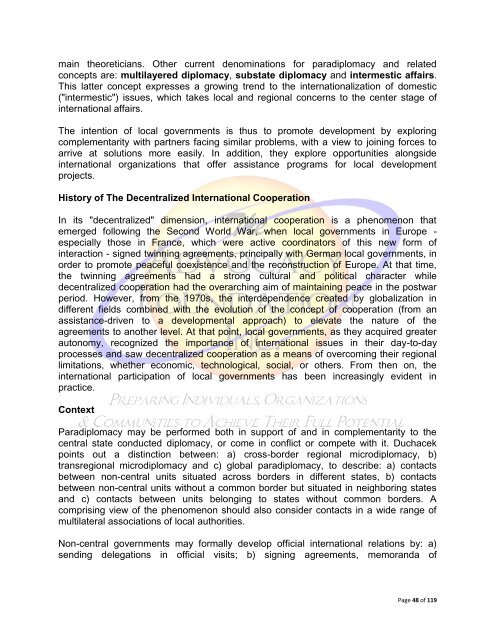International Legal Evangelism: Intelligence, Reconnaissance & Missions
International Legal Evangelism: Intelligence, Reconnaissance & Missions
International Legal Evangelism: Intelligence, Reconnaissance & Missions
Create successful ePaper yourself
Turn your PDF publications into a flip-book with our unique Google optimized e-Paper software.
main theoreticians. Other current denominations for paradiplomacy and related<br />
concepts are: multilayered diplomacy, substate diplomacy and intermestic affairs.<br />
This latter concept expresses a growing trend to the internationalization of domestic<br />
("intermestic") issues, which takes local and regional concerns to the center stage of<br />
international affairs.<br />
The intention of local governments is thus to promote development by exploring<br />
complementarity with partners facing similar problems, with a view to joining forces to<br />
arrive at solutions more easily. In addition, they explore opportunities alongside<br />
international organizations that offer assistance programs for local development<br />
projects.<br />
History of The Decentralized <strong>International</strong> Cooperation<br />
In its "decentralized" dimension, international cooperation is a phenomenon that<br />
emerged following the Second World War, when local governments in Europe -<br />
especially those in France, which were active coordinators of this new form of<br />
interaction - signed twinning agreements, principally with German local governments, in<br />
order to promote peaceful coexistence and the reconstruction of Europe. At that time,<br />
the twinning agreements had a strong cultural and political character while<br />
decentralized cooperation had the overarching aim of maintaining peace in the postwar<br />
period. However, from the 1970s, the interdependence created by globalization in<br />
different fields combined with the evolution of the concept of cooperation (from an<br />
assistance-driven to a developmental approach) to elevate the nature of the<br />
agreements to another level. At that point, local governments, as they acquired greater<br />
autonomy, recognized the importance of international issues in their day-to-day<br />
processes and saw decentralized cooperation as a means of overcoming their regional<br />
limitations, whether economic, technological, social, or others. From then on, the<br />
international participation of local governments has been increasingly evident in<br />
practice.<br />
Context<br />
Paradiplomacy may be performed both in support of and in complementarity to the<br />
central state conducted diplomacy, or come in conflict or compete with it. Duchacek<br />
points out a distinction between: a) cross-border regional microdiplomacy, b)<br />
transregional microdiplomacy and c) global paradiplomacy, to describe: a) contacts<br />
between non-central units situated across borders in different states, b) contacts<br />
between non-central units without a common border but situated in neighboring states<br />
and c) contacts between units belonging to states without common borders. A<br />
comprising view of the phenomenon should also consider contacts in a wide range of<br />
multilateral associations of local authorities.<br />
Non-central governments may formally develop official international relations by: a)<br />
sending delegations in official visits; b) signing agreements, memoranda of<br />
Page 48 of 119

















